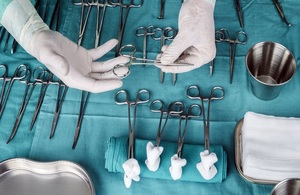Market exploration: surgical instrument sterilisation in austere environments
DASA wants to identify the current market capability to deliver Medical Device Decontamination Capabilities within Defence’s highly mobile medical facilities.

Surgical instrument sterilisation in austere environments
Summary
On behalf of the UK Ministry of Defence (MOD), the Defence and Security Accelerator (DASA) is considering the potential for a competition to identify the means to deliver Medical Device Decontamination Capabilities (MDDC) within Defence’s highly mobile medical facilities, all of which are designed to operate and deliver healthcare in austere environments.
This exploration is to better understand the current market and to potentially identify alternative ways to deliver high standards of decontamination of packed surgical items, when logistics, mobility and time to establish a MDDC capability are limited. This information will provide us with the knowledge on what potential MDDC capabilities already exist, novel solutions in development and areas that potentially require further investment by MOD.
Please note that this request for information is not a commitment to subsequently launch a formal DASA competition.
Background
Due to the nature of the future operational environment, where forces will be highly mobile, operating at reach from large logistic hubs and where engineering support may be limited, alternative ways of delivering sterilisation of surgical instruments will be needed.
Defence operate and deploy a number of different medical treatment facilities, where the level of surgical procedures conducted varies from, damage control surgery up to primary and restorative surgery. In the future operating environment, medical treatment facilities will need to move frequently, be delivered to sites by means which cannot limit the pitch, roll or angle at which potential solutions might be exposed to prior to establishment. They will need to be able to operate after significant changes in altitude and temperature, whilst also being capable of being established and certified by user communities (nursing or operating department practitioners), rather than contracted specialists.
Current in-service systems rely on either wet heat to deliver sterilisation for packed surgical kits. However, there may be solutions which exist where sterilisation may not even be required; this could include sterile 3D printing, use of chemicals or plasma sterilisation.
Essential requirements
- the ability to deliver sterilised instruments to surgical treatment teams in packaged and pre-prepared wrappings
- any system should be capable of being transited in temperatures of between -30°C to +55°C and relative humidity values could be up to 55%
- any system will be required to operate in potential operating ranges of 0°C to +40°C
- the cycle of effort should be based upon the ability to decontaminate a ‘set’ of surgical instruments at a rate of once per hour up to every three hours – with a rate not expecting to be above that of eight complete sets per day
- as a minimum, the standards of sterilisation must be aligned to a recognisable international standard
- identify any other requirements (such as a washer disinfector, water treatment, ultrasonic cleaner) required to deliver the effect
- any power requirements should be aligned with 240v 50/60 Hz AC single phase
- the system shall be capable of sterilising a set of surgical instruments that can be packed into a container
- current containers range from between 425mm (L) x 190mm (W) x 85 to 180mm (H). However, this should not be seen as a limiting range.
- the system must not rely on plumbed or access to piped or pressurised water supplies
Desirable requirements
- complete solutions: fully integrated systems are ideal
- low personnel demands: deployable by 2 or 3 personnel, low training demand
- modifiable: power, configuration, logistic and engineering demands
What we want
Defence is particularly interested in turn-key, fully-integrated novel solutions which provide MDDC capabilities designed for deployment in austere/challenging environments.
What we don’t want
We are not interested in solutions that will require sophisticated infrastructure, logistical or engineering demands or the need for a high degree of training in order to deploy.
This is not a competition and therefore we are not asking for costed proposals at this stage. However, we have asked for your estimated cost range to inform future activities. This is a market engagement request for information exercise, and we do not commit to subsequently launch a formal DASA competition.
How to submit a Capability Submission Form
Responses to this market exploration must be submitted via the DASA submission service, for which you will be required to register. We recommend you use a Google Chrome browser to access the DASA submission service.
There are 6 questions relating to your capability, where we are seeking to understand what and how much further development is required for a complete solution to all requirements, or whether a combination of separate solutions is required. The information you provide will assist in developing a statement of requirements for potential future activities. You will not be held to deliver to any of the timescales or cost estimates that you may give.
Submissions must be submitted by midday on Tuesday 8th December 2020.
Please only provide details of one product/capability per form. If you have a number of potential solutions, then please submit multiple forms. If you have any questions, then please email accelerator@dstl.gov.uk with ‘MDDC’ in the subject line.
How we use your information
Information you provide to us in a Capability Submission, that is not already available to us from other sources, will be handled in-confidence. By submitting a Capability Submission Form you are giving us permission to keep and use the information for our internal purposes, and to provide the information onwards, in-confidence, within UK Government. The Defence and Security Accelerator will not use or disclose the information for any other purpose, without first requesting permission to do so.